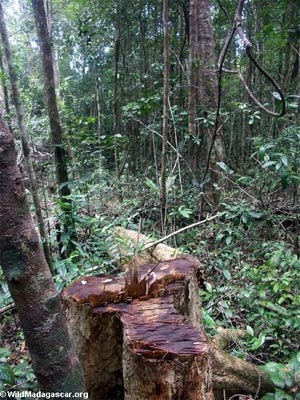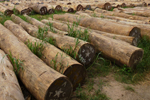-EIA.568.jpg)
Logs smuggled across the border from Myanmar to China. Photo © : EIA.
Runaway economic growth comes with costs: in the case of China’s economic engine, one of them has been the world’s forests. According to a new report by the Environmental Investigation Agency (EIA), China has become the number one importer of illegal wood products from around the world. Illegal logging—which threatens biodiversity, emits carbon, impoverishes local communities, and is often coupled with other crimes—has come under heavy pressure in recent years from the U.S., the EU, and Australia. Each of these has implemented, or will soon implement, new laws that make importing and selling illegal wood products domestic crimes. However, China’s unwillingness to tackle its vast appetite for illegal timber means the trade continues to decimate forests worldwide.
“China is now the biggest importer, exporter, and consumer of illegal timber in the world,” the report, Appetite for Destruction: China’s Trade in Illegal Timber, reads.
Launched today in Beijing, the new EIA report estimates that in 2011 China imported at least 18.5 million cubic meters of illegal logs and sawn timber, worth around $3.7 billion. Taken together, this amount would fill nearly a million standard 20-foot shipping containers. Even this does not tell the full story, as the new report did not analyze other wood products imports, which make up 55 percent of China’s total trade in wood.
-EIA.360.jpg) Log truck en route to Beira, Mozambique. Photo © : EIA. |
“China is now effectively exporting deforestation around the world,” Faith Doherty, head of EIA’s Forests Campaign, explains in a statement.
For example, the report finds that in 2011, China imported at the very least 11.8 million cubic meters of illegal raw logs. Forty-seven percent of these illegal logs (5.6 million cubic meters) came from Russia while 21 percent (2.5 million cubic meters) came from Papua New Guinea. Logging, mining, and massive hydrocarbon projects have recently sprung up across Papua New Guinea, creating local conflict and often separating locals from the forests they have depended on for millennia. The report warns that “at the current rate, commercial forests [in Papua New Guinea] could be exhausted in a decade.”
The remaining illegal logs last year came from the Solomon Islands (12 percent), Myanmar (4 percent), Republic of the Congo (4 percent), Equatorial Guinea (2 percent), and Mozambique (1.5 percent).
“More than half of China’s current supplies of raw timber material are sourced from countries with a high risk of illegal logging and poor forest governance,” the report warns, noting that once China exhausts forests in one country, it moves onto another.
Ironically, even as China has increasingly depended on raw logs and timber from abroad, it has undertaken herculean efforts to grow and protect forests at home. In the last two decades, China’s forest cover has grown by 30 percent—while forest cover worldwide continues to plummet.
“Since the late 1990s the country has taken strong measures to protect and grow its own forests. At the same time it has built a vast wood processing industry, reliant on imports for most of its raw materials supply,” reads the report.
In the past the bulk of illegal logs entering China would be fashioned into products and shipped abroad, but today the illicit trade has moved more and more toward meeting increased domestic demand for luxury woods.
 Illegal rosewood logging in Masoala National Park. Photo by Rhett A. Butler |
“The vast construction effort in China, coupled with increasing wealth, is creating a surge in domestic demand for timber products,” states the report. “A vivid example is the fashion for reproduction furniture made from rare rosewoods, which has created an upsurge in illegal logging from the Mekong region to Madagascar.”
A government coup in 2009 led to the plundering of Madgascar’s vanishing forests, including rainforests within protected areas. Loggers targeted the highly-valuable rosewood, despite a ban on cutting the increasingly rare species. EIA investigations found that 95 percent of the rosewood was at the behest of Chinese traders.
Despite such high-profile devastation, the report finds that the Chinese government “has done virtually nothing to curb illegal imports,” and has largely encouraged it by “putting in place policies to ensure supply from some of the worst illegal logging hotspots in the world.”
With its new report the EIA urges China to begin to take illegal logging seriously. It recommends the superpower spell out a clear prohibition on the importation of illegal logging, introduce anti-corruption laws, and set up a body of experts from various departments to eradicate illegal logging from the supply trade.
In the meantime, the report also recommends that nations with laws against importing illegal wood products—i.e. the U.S., the EU, and Australia—keep a wary eye on imports from China.
“Any further meaningful progress to safeguard the forests of the world is being undermined unless the Chinese Government acts swiftly and decisively to significantly strengthen its enforcement and ensure that illegal timber is barred from its markets,” Doherty says.
Illegal logging, which is often run by large international mafias, occurs in tandem with other crimes, such as drugs and human trafficking. In some countries, activists and journalists who speak out against illegal logging are met with threats, violence, and even murder. This year, a forest activist, Chut Wutty, was killed while investigating illegal logging in Cambodia; months later a journalist covering illegal logging, also in Cambodia, was found dead in the trunk of his car likely due to an axe wound to the head.
-EIA.568.jpg)
Luxury table set made with Himalayan Yew from Myanmar. Sells for $6,000. Photo © : EIA.
Related articles
Australia outlaws illegally-logged wood from abroad
(11/21/2012) In another blow to illegal loggers, Australia has passed the Illegal Logging Prohibition Bill, joining the U.S. in outlawing the importation of illegal logged timber from abroad. The new legislation makes it a criminal offense for Australian businesses to import timber from illegal operations. The Australian government estimates that $400 million worth of illegal timber products are sold in the country each year often as outdoor furniture and wood for decks

(11/08/2012) In 2002 the Democratic Republic of Congo (DRC) announced a moratorium on commercial logging in a bid to save rapidly falling forests, however a new report by Global Witness alleges that industrial loggers are finding away around the logging freeze. Through unscrupulous officials, foreign companies are abusing artisanal permits—meant for local community logging—to clear-cut wide swathes of tropical forest in the country. These logging companies are often targeting an endangered tree—wenge (Millettia laurentii)—largely for buyers in China and Europe.

(11/02/2012) HSBC has earned tens of millions financing the destruction of rainforests and invasion of indigenous land in the Malaysian state of Sarawak on the island of Borneo, alleges an explosive new report from Global Witness.
Smuggling of illegally logged rosewood in Madagascar continues, alleges report
(10/25/2012) Timber traders in Madagascar are smuggling illegally logged rosewood despite an official export ban, alleges a new report published by a Malagasy researcher.
Cambodia drops case of murdered forest activist, Chut Wutty
(10/08/2012) An investigation into the mysterious death of Cambodian forest activist, Chut Wutty, has been dismissed by the courts, which critics allege is apart of an ongoing cover up. The court decided that since the suspect in Wutty’s death, In Rattana, was also dead there was no need to proceed. Chut Witty was shot to death while escorting two journalists to a logging site run by Timbergreen. Wutty, whose death made international news, was a prominent activist against illegal logging in Cambodia.
Illegal logging worth $30-100B annually
(10/01/2012) Illegal logging accounts for 15-30 percent of forestry in the tropics and is worth $30-100 billion worldwide, alleges a new report published by the United Nations Environment Programme (UNEP) and INTERPOL. Consuming countries play a major role in the trade, which is increasingly sophisticated and in some places is facilitated by the expansion of industrial plantations.
Another journalist attacked in Cambodia for covering illegal logging
(09/27/2012) Two weeks after an environmental journalist was found murdered in the trunk of his car, another journalist has been brutally attacked in Cambodia. Ek Sokunthy with the local paper Ta Prum says he was beaten in his home by three assailants by a pistol and a stick. The attack follows swiftly after the high-profile murder of 44-year-old forest journalist Hang Serei Oudom.
Corruption still plundering forests in Laos for furniture
(09/26/2012) The forests of Lao are still suffering from widespread destruction with the government turning a blind eye to a thriving black market logging trade on the border of Laos and Vietnam, according to an update report by the Environmental Investigation Agency (EIA). Last year, the EIA found that powerful players, including the Vietnamese military, were plundering Laos of its forests for raw logs. Smuggled from Laos into Vietnam, the raw logs are crafted into furniture, which are eventually exported to Europe and the U.S. Now, over a year later a new report finds little has changed.
Environmental journalist investigating illegal logging murdered in Cambodia
(09/13/2012) Less than five months after high-profile forest activist, Chut Wutty, was killed in Cambodia, an environmental journalist, Hang Serei Oudom, has been found slain in the trunk of his car, possibly murdered with an ax, reports the AFP. Oudum, who worked at the local paper Vorakchun Khmer Daily, was known for writing stories on epidemic of illegal logging in Cambodia, often linking the crime to business people and politicians. The car and body were found in a cashew nut plantation in Ratanakiri province, an area rife with logging.